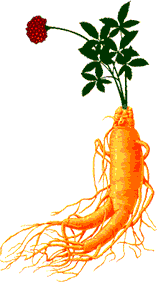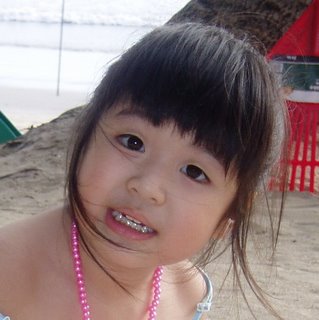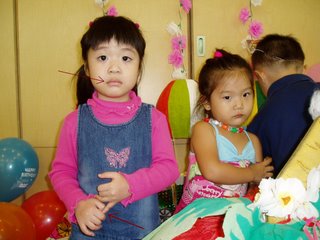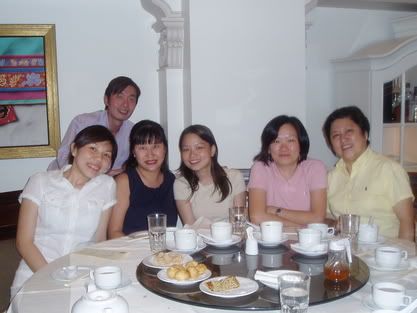
This picture best illustrates how I am feeling now
I needed to get new supplies of Korean Red Ginseng as my supply at home has finished. Just a trip to the Medical Hall saw me $1000 poorer. Mom seeing that I needed to get (1986) Korean Red Ginseng decided to share half with me. So we bought the whole box of it, the lady helped us sliced it and then separate it equally for us.
I know some people will buy Korean Ginseng from Korea and claim its efficacy. Well, what i heard from people is that it is very heaty. My MIL has asked me to give it to my hubby to help him with his asthma, which she claims it has helped her daughter (my SIL). I don't deny that it might work on her but it works differently on different people. If it works on you, go ahead and take it. If not.. spend more money ( I still believe in 一分钱,一分huo) to get the best.
You might be thinking why this is heaty and the ones that we bought is not heaty. Well, some knowledge that I have and would like to share is -
It takes 6 years for Ginseng to be fully grown. The ones that people buy from Korean are consumed immediately once they reached 6 years. The ones that we bought go through a process of heating etc.. and kept for many years. The older they are; the more expensive it is.

WHAT IS KOREAN RED GINSENG?Korean ginseng is very powerful. Korean ginseng comes in red and white form.The herb,korean ginseng is one of the most widely used and acclaimed herbs in the world. Korean ginseng scientific name is Panax ginseng, which is the species from which Chinese ginseng, Korean ginseng (red, and white ginseng) are produced. Chinese and Korean ginseng are the same plant cultivated in different regions, and have slightly different properties according to Chinese medicine. White ginseng is simply the dried or powdered root of Korean ginseng, while red ginseng is the same root (korean ginseng) that is steamed and dried in heat or sunlight. Red korean ginseng is said to be slightly stronger and more stimulating in the body than white korean ginseng, according to Chinese herbalism.
Korean ginseng has had a long and illustrious history as an herb for health, and has been used for thousands of years throughout the Orient as a medicine and tonic. Early Chinese medicine texts written in the first century A.D. mention ginseng, and ginseng has long been classified by Chinese medicine as a "superior" herb. This means it is said to promote longevity and vitality. Legends around the world have touted ginseng as an aphrodisiac and sexual tonic. Researchers have found a slight connection between sex drive and consuming ginseng, although a direct link and the mechanism of action are still researched and disputed.
Korean ginseng grows on moist, shaded mountainsides in China, Korea, and Russia. It is a perennial herb that reaches heights of two or more feet, and is distinguished by its dark green leaves and red clusters of berries. The root of the plant is the part valued for its medicinal properties. The root is long and slender and sometimes resembles the shape of the human body. Asian legends claim that this "man-root" has magical powers for those lucky enough to afford or find it, and the roots bearing the closest resemblance to the human body are still the most valuable ones. The word ren shen in Chinese means roughly "the essence of the earth in the shape of a man."
Korean ginseng has historically been one of the most expensive of herbs, as it has been highly in demand in China and the Far East for centuries. Wars have been fought in Asia over lands where it grew wild. Wild Korean ginseng is now nearly extinct from many regions. Single roots of wild plants have recently been auctioned in China and New York City for sums approaching $50,000. Most of the world's supply of Korean ginseng is cultivated by farmers in Korea and China.
Both American and Siberian ginseng are considered by Chinese herbalists to be different herbs than Korean ginseng, and are said to have different effects and healing properties in the body. To add more confusion, there are eight herbs in Chinese medicine which are sometimes called ginseng, including black ginseng, purple ginseng, and prince's ginseng, some of which are not at all botanically related to Panax ginseng, so consumers should choose ginseng products with awareness.
General use
The word panax is formed from Greek roots meaning "cure-all," and Panax ginseng has long been considered to be one of the great healing and strengthening herbs in natural medicine. Ginseng is classified as an adaptogen, which is a substance that helps the body adapt to stress and balance itself without causing major side effects. Korean ginseng is used as a tonic for improving overall health and stamina, and Chinese herbalists particularly recommend it for the ill, weak, or elderly. Korean ginseng has long been asserted to have longevity, anti-senility, and memory improvement effects in the aged population. As it helps the body to adapt to stress, athletes may use ginseng as herbal support during rigorous training. Korean ginseng generally increases physical and mental energy. It is a good tonic for the adrenal glands, and is used by those suffering from exhaustion, burnout, or debilitation from chronic illness.
Traditional Chinese medicine also prescribes Korean ginseng to treat diabetes, and research has shown that it enhances the release of insulin from the pancreas and lowers blood sugar levels. Korean ginseng has been demonstrated to lower blood cholesterol levels. It has also been shown to have antioxidant effects and to increase immune system activity, which makes it a good herbal support for those suffering from cancer and AIDS and other chronic conditions that impair the immune system. Further uses of Korean ginseng in Chinese medicine include treatment of impotence, asthma, and digestive weakness.
Research
Scientists have isolated what they believe are the primary active ingredients in ginseng, chemicals termed saponin triterpenoid glycosides, or commonly called ginsenocides. There are nearly 30 ginsenocides in Korean ginseng. Much research on Korean ginseng has been conducted in China, but controlled human experiments with it have not been easily accessible to the English-speaking world. Recent research in China was summarized by Dr. C. Lui in the February 1992 issue of the Journal of Ethnopharmacology, where he wrote that Panax ginseng was found to contain 28 ginsenocides that "act on the central nervous system, cardiovascular system and endocrine secretion, promote immune function, and have effects on anti-aging and relieving stress."
To summarize other research, Korean ginseng has been shown in studies to have significant effects for the following.
· Physical improvement and performance enhancement for athletes: A study performed over three years in Germany showed athletes given ginseng had favorable improvement in several categories over a control group who took a placebo. Another 1982 study showed that athletes given ginseng had improved oxygen intake and faster recovery time than those given placebos.
· Mental performance improvement and mood enhancement: In general, studies show that ginseng enhances mental performance, learning time, and memory. One study of sixteen volunteers showed improvement on a wide variety of mental tests, including mathematics. Another study showed that those performing intricate and mentally demanding tasks improved performance when given Korean ginseng. Finally, a study has shown improvement of mood in depression sufferers with the use of ginseng.
· Antifatigue and antistress actions: Patients with chronic fatigue who were given ginseng showed a statistically significant improvement in physical tests and in mental attention and concentration, when compared with those given placebos.
· Lowering blood sugar: Animal studies have shown that ginseng can facilitate the release of insulin from the pancreas and increase the number of insulin receptors in the body.
· Antioxidant properties: Scientific analysis of ginseng has shown that it has antioxidant effects, similar to the effects of vitamins A, C, and E. Thus, ginseng could be beneficial in combating the negative effects of pollution, radiation, and aging.
· Cholesterol reduction: Some studies have shown that Korean ginseng reduces total cholesterol and increases levels of good cholesterol in the body.
· Anticancer effects and immune system stimulation: Several tests have shown that Korean ginseng increases immune cell activity in the body, including the activity of T-cells and lymphocytes, which are instrumental in fighting cancer and other immune system disorders like AIDS. A Korean study indicates that taking ginseng may reduce the chances of getting cancer, as a survey of more than 1,800 patients in a hospital in Seoul showed that those who did not have cancer were more likely to have taken ginseng regularly than those patients who had contracted cancer.
· Physical and mental improvement in the elderly: One study showed significant improvement in an elderly test group in visual and auditory reaction time and cardiopulmonary function when given controlled amounts of Korean ginseng. Korean ginseng has also been shown to alleviate symptoms of menopause.
· Impotence: Studies of human sexual function and Korean ginseng have been generally inconclusive, despite the wide acclaim of ginseng as a sexual tonic. Tests with lab animals and ginseng have shown some interesting results, indicating that Korean ginseng promotes the growth of male reproductive organs, increases sperm and testosterone levels, and increases sexual activity in laboratory animals. In general, scientists believe the link between ginseng and sex drive is due to ginseng's effect of strengthening overall health and balancing the hormonal system.
Preparations
Korean ginseng can be purchased as whole roots, powder, liquid extracts, and tea. Roots should be sliced and boiled in water for up to 45 minutes to extract all the beneficial nutrients. One to five grams of dry root is the recommended amount for one serving of tea. Herbalists recommend that ginseng not be boiled in metal pots, to protect its antioxidant properties. Ginseng should be taken between meals for best assimilation.
Precautions
Consumers should be aware of the different kinds of ginseng, and which type is best suited for them. Red Korean ginseng is considered stronger and more stimulating than white, wild ginseng is stronger than cultivated, and Korean ginseng is generally believed to be slightly stronger than Chinese. Furthermore, American and Siberian ginseng have slightly different properties than Korean ginseng, and consumers should make an informed choice as to which herb is best suited for them. Chinese herbalists do not recommend Korean ginseng for those people who have "heat" disorders in their bodies, such as ulcers, high blood pressure, tension headaches, and symptoms associated with high stress levels. Korean ginseng is generally not recommended for those with symptoms of nervousness, mental imbalance, inflammation, or fever. Korean ginseng is not recommended for pregnant or lactating women, and women of childbearing age should use ginseng sparingly, as some studies imply that it can influence estrogen levels. Also, Chinese herbalists typically only prescribe ginseng to older people or the weak, as they believe that younger and stronger people do not benefit as much from it and ginseng is "wasted on the young."


















